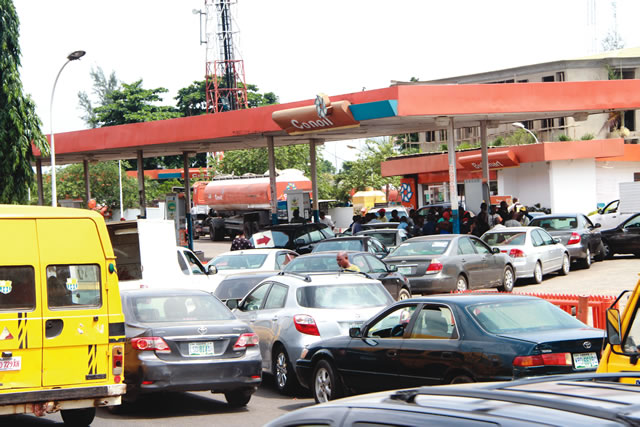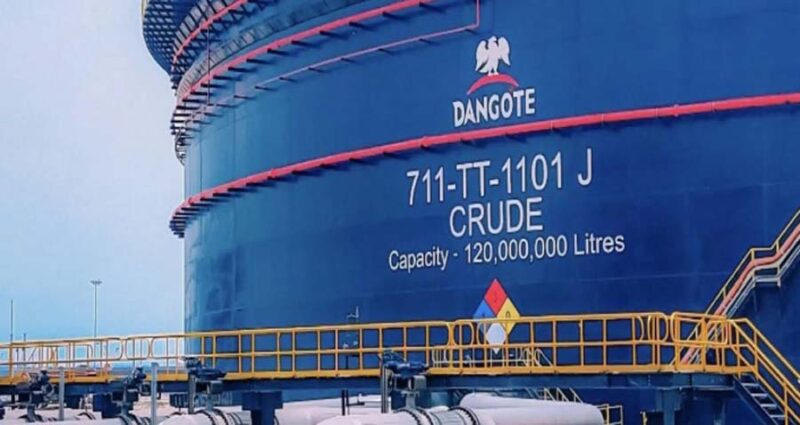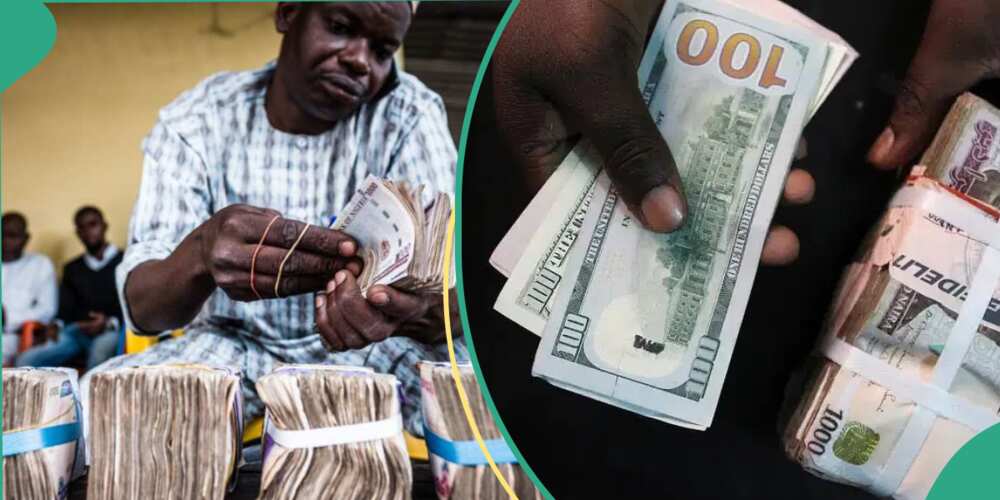Business
Fuel queues return as marketers raise petrol price to N170/litre

Some filling stations in Lagos are witnessing the return of motorists queuing up for petrol as fuel marketers have started adjusting their petrol pump prices from N162 to N170 per litre following the rise in the landing cost of the product from N151 to N180 per litre.
Some filling stations that claim to have run out of petrol are not open for business starting from Tuesday. There are also reports of supply shortage at private depots in Apapa, Lagos.
Already, The PUNCH reported on Tuesday that some filling stations in Lagos and Ogun states had increased the pump price of petrol to N170 per litre from N162 per litre.
Some of the stations were Capital Oil and Gas, Fatgbems and Amo Oil, all along the Lagos-Ibadan Expressway. Another station, Enyo Retail, adjusted its pump price to N165 per litre from N162.
The National Operation Controller, Independent Petroleum Marketers Association of Nigeria, Mr Mike Osatuyi, said members of his association had to increase the pump price because they bought the product at N160-N161 from depot owners.
The PUNCH reported last Thursday that IPMAN members disrupted loading of petroleum products at private depots in Apapa on Wednesday as well as Ibadan, Ejigbo and Mosimi depots belonging to the Nigerian National Petroleum Corporation.
They picketed the facilities to protest their inability to get products due to a new payment method introduced by the Petroleum Products Marketing Company, a subsidiary of the NNPC.
“My members buying from DAPPMAN members are buying at N160-N161, and they will have to add their transportation costs to it. So, at what price do you want them to sell? Even that N170 is still very cheap,” Osatuyi said on Tuesday.
He said the PPMC had told marketers to register under the new payment method, called ‘PPMC Customer Express’, before they could buy products from it.
“Right now, PPMC has said that the era of ATP (Authority to Pay) has gone. It means that payment has to be made online. So, my members are now in the process of doing that, and without doing it, we cannot lift products,” he added.
The NNPC, which has been the sole importer of petrol into the country in recent years, is still being relied upon by depots and marketers for the supply of the product despite the deregulation of the downstream petroleum sector.
Our correspondent also gathered that many private depots in Apapa, Lagos, from where many marketers get petroleum products for distribution to other states, were running dry of petrol due to supply shortage.
When contacted, the Group General Manager, Group Public Affairs Division of the Corporation, Dr Kennie Obateru, told our correspondent that there was no shortage of petrol supply from the NNPC.
He said, “We have 1.7 billion litres of product as at today, which will give us about 40 days’ sufficiency. Even some more vessels are on the programme.
“And we have not increased our ex-depot price; even though we know some of them (marketers) are sort of slowing down because they are expecting that we will react to the crude oil price increase. But for now, we haven’t done that.”
One of the major private depots told marketers to stop payment for the petrol because of the supply shortage and the uncertainty over when it would get the product.
A top official of a Lagos-based oil marketing company told our correspondent on condition of anonymity that there had been erratic supply of petrol to private depots in Apapa since last week.
Business
Govt paying N600bn for fuel subsidy monthly — Rainoil CEO

Govt paying N600bn for fuel subsidy monthly — Rainoil CEO
The CEO of Rainoil Limited, Gabriel Ogbechie, has claimed that the federal government resumed the payment of the controversial fuel subsidy following the devaluation of the Naira in the foreign exchange market.
Ogbechie made this statement on Tuesday during the Stanbic IBTC Energy and Infrastructure Breakfast Session held in Lagos.
He pointed out that with Nigeria’s daily fuel usage at 40 million liters and the foreign exchange rate at N1,300, the government’s subsidy per liter of fuel falls between N400 and N500, culminating in a monthly total of approximately N600 billion.
He said; “When Mr. President came in May last year, one of the things he said was that Subsidy is gone. And truly, the subsidy was gone, because immediately the price of fuel moved from 200 to 500 per liter. At that point truly, subsidy was gone.
“During that period, Dollar was exchanging for N460, but a few weeks later, the government devalued the exchange rate. And Dollar moved to about N750. At that point, subsidy was beginning to come back.
READ ALSO:
- North Central Support Group rejects Northern Elders, pledges allegiance to Asiwaju
- Gunmen kidnap 2 FRSC officers along Abakaliki-Enugu highway
- Driver killed, 16 passengers abducted on Abuja-Lokoja road
“The moment the two markets officially closed, officially the market went to about N1,300. At that point, that conversation was out of the window. Subsidy was fully back on petrol. If you want to know where petrol should be, just look at where diesel is. Diesel is about N1,300 and petrol is still selling for N600.
Furthermore, he said that NNPC being the only petrol importer in the country implies that there is an ongoing subsidy, as prices had to be fixed.
Earlier yesterday, the former governor of Kaduna State, Nasir El Rufai, said the federal government is spending more on petrol subsidy than before.
In addition, the Special Adviser to the President on Energy, Mrs. Olu Veŕheijen, said that the Federal Government reserves the right to pay fuel subsidy intermittently to cushion hardship in the country.
“The subsidy was removed on May 29. However, the government has the prerogative to maintain price stability to address social unrest. They reserve the right to intervene.
“If the government feels that it cannot continue to allow prices to fluctuate due to high inflation and exchange rates, the government reserves the right to intervene intermittently and that does not negate the fact that subsidy has been removed,” she said.
Govt paying N600bn for fuel subsidy monthly — Rainoil CEO
Business
Breaking: Dangote brings diesel price down to N1000/litre

Breaking: Dangote brings diesel price down to N1000/litre
Dangote Petroleum Refinery has announced a further reduction in the price of diesel.
When it commenced operation a few weeks ago, Dangote Petroleum Refinery pegged the price of diesel as N1,200.
While rolling out the products, the refinery supplied at a substantially reduced price of N1,200 per litre three weeks ago, representing over 30 percent reduction from the previous market price of about N1,600 per litre.
READ ALSO:
- Kano anti-corruption agency slams fresh charges against Ganduje
- Troops kill ISWAP Commanders, 30 other terrorists
- Ooni of Ife dismisses agitators of Yoruba nation
However, on Tuesday, a further reduction of N200 was noticed in the price, with the product now pegged at N1,000.
This significant reduction in the price of diesel, at Dangote Petroleum Refinery, is expected to positively affect all the spheres of the economy and ultimately reduce the high inflation rate in the country.
The President of Dangote Group, Aliko Dangote, had during the Eid-el-Fitr celebration said if the cost price of diesel comes down, the inflation rate will be substantially reduced.
Dangote spoke when he visited President Bola Tinubu in his residence in Lagos State to celebrate the end of the Ramadan fast with him.
Breaking: Dangote brings diesel price down to N1000/litre
Business
Naira records five-month highest gain, sells below N1000/$ at parallel market

Naira records five-month highest gain, sells below N1000/$ at parallel market
The naira continued its positive showing against the United States dollar on Monday, selling below N1000/$ in some segments of the parallel market.
Newstrends reports that the Federal Government, groups and some individuals have mounted a spirited campaign for those hoarding the dollars to push them out as naira continues to appreciate.
On Monday, the naira was offered in some parts of Lagos and Abuja between N995 and N1,050 per dollar in the parallel market. It was N1,230/$ on Friday.
The latest gain, being over five-month highs, came in the wake of the Iranian attack on Israel and a rise in the crude oil price.
Goldman Sachs, American investment bank economists, had earlier predicted that the naira’s bullish momentum on the foreign exchange market would likely cause it to trade for less than N1,000 per US dollar in the coming months.
According to a report by Nairametrics, the group claimed that the rally in Nigerian currency helped recover from large losses after two devaluations since last June by being bolstered by capital inflows and successive interest rate hikes.
In March, Goldman Sachs projected that the Naira would appreciate to N1,200 per dollar in 2024.
At the official foreign exchange market, the rate was put at N1,136/$ in contrast with N1,205/$ last Friday.
The top bank has implemented several policy initiatives in recent months to bring stability to the foreign exchange market.
The CBN increased interest rates to 24.75% at the most recent meeting of the Monetary Policy Committee (MPC), which helped it recover losses from the two devaluations that occurred since June of last year.
Further gains for the naira result from the CBN’s ongoing intervention, which involves selling foreign exchange to Bureau De Change operators at a revised rate.
The market anticipates higher inflows of US dollars from the sale of foreign currency bonds in the second quarter as disclosed by Finance Minister Wale Edun.
The Federal Government has just offered high-yield short-term debt products at a premium to entice overseas capital into the economy.
The Middle East’s geopolitical unrest and
Notwithstanding a drop in Nigeria’s production volume, crude oil prices have risen beyond $90.
Nigerian grades of oil are trading at a premium to the ICE Brent benchmark.
The Middle East’s geopolitical unrest and the anticipation of an Iranian government strike on Israel caused oil prices to soar.
-

 metro7 days ago
metro7 days agoTroops arrest ISWAP commander involved in Army General, 3 soldiers’ killing in Borno
-

 News7 days ago
News7 days agoBREAKING: Ex-Abia gov, Ogbonnaya Onu, is dead
-

 Sports6 days ago
Sports6 days agoKane’s three children involved in car crash, hospitalised
-

 metro5 days ago
metro5 days agoTroops neutralise 188 terrorists, rescue 133 hostages in assault operations
-

 News5 days ago
News5 days agoFG gives update on where fleeing Binance executive is hiding
-

 News7 days ago
News7 days agoEdo APC chairman visits Shaibu after impeachment
-

 Entertainment5 days ago
Entertainment5 days agoTolani Baj expresses love for Bobrisky
-

 Business5 days ago
Business5 days agoNaira continues gain, sold N1,150/$ at parallel market























You must be logged in to post a comment Login